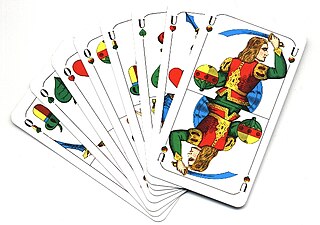
Schafkopf, also called Bavarian Schafkopf, is a popular German trick-taking card game of the ace–ten family for four players that evolved, towards the end of the 19th century, from German Schafkopf. It is still very popular in Bavaria, where it is their national card game played by around two million people, but it also played elsewhere in Germany and in Austria. It is an official cultural asset and important part of the Old Bavarian and Franconian way of life. Schafkopf is a mentally demanding pastime that is considered "the supreme discipline of Bavarian card games" and "the mother of all trump games."

Cego is a Tarot card game for three or four players played mainly in and around the Black Forest region of Germany. It was probably derived from the three-player Badenese game of Dreierles when soldiers deployed from the Iberian Peninsula during the Napoleonic Wars and, based on a Spanish game they had encountered, introduced Cego's distinctive feature: a concealed hand, or blind. Cego has experienced a revival in recent years, being seen as part of the culture of the Black Forest and surrounding region. It has been called the national game of Baden and described as a "family classic".

The following is a glossary of terms used in card games. Besides the terms listed here, there are thousands of common and uncommon slang terms. Terms in this glossary should not be game-specific, but apply to a wide range of card games played with non-proprietary packs. It should not include terms solely related to casino or banking games. For glossaries that relate primarily to one game or family of similar games, see Game-specific glossaries.

German solo or just solo is a German 8-card plain-trick game for 4 individual players using a 32-card, German- or French-suited skat pack. It is essentially a simplification of quadrille, itself a 4-player adaptation of ombre. As in quadrille, players bid for the privilege of declaring trumps and deciding whether to play alone or with a partner. Along with ombre, Tarock and Schafkopf, German solo influenced the development of skat. Parlett calls it a "neat little descendant of Quadrille" and "a pleasant introduction" to the ombre family of games.
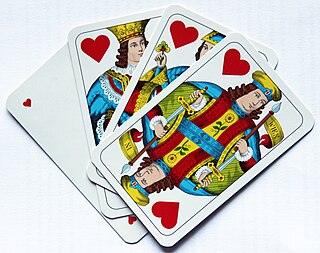
Préférence, frequently spelt Preference, is a Central and Eastern European 10-card plain-trick game with bidding, played by three players with a 32-card Piquet deck, and probably originating in early 19th century Austria, becoming the second most popular game in Vienna by 1980. It also took off in Russia where it was played by the higher echelons of society, the regional variant known as Preferans being still very popular in that country, while other variants are played from Lithuania to Greece.

Tapp Tarock, also called Viennese Tappen, Tappen or Tapper, is a three-player tarot card game which traditionally uses the 54-card Industrie und Glück deck. Before the Anschluss (1938), it was the preferred card game of Viennese coffee houses, for example, the Literatencafés and Café Central. Even today Tapp Tarock is played sporadically. The exact date when it appeared is not possible to identify; some sources suggest it may have been developed in Austria in the early 19th century, but its mention in caricature operas in 1806 suggest it was well known even by then and must have arisen in the late 18th century. The oldest description of the actual rules is dated to 1821. Tapp Tarock is considered a good entry level game before players attempt more complex Tarock forms like Cego, Illustrated Tarock or Königrufen.

Bauerntarock also called Brixentaler Bauerntarock or Brixental Tarock, is a point-trick card game played in the Brixental, Austria. It may have originated in the 19th century either as an adaptation of 54-card Tapp Tarock onto the cheaper and smaller 36-card German pack. Another possibility is that it was adapted from the 78-card Grosstarock or Taroc l'Hombre game as the ratio of trumps to non-trumps is almost the same. It uses the Skat Schedule found in popular regional games such as Jass and Schafkopf. It is closely related to Bavarian Tarock, German Tarok, Württemberg Tarock and especially Dobbm. Like Bavarian Tarock and Tapp, Brixental Bauerntarock and Dobbm do not belong to the true tarot games, but have adopted rules from Tapp Tarock. The most fundamental difference between these games and true tarot games is in the use of German or French decks instead of true Tarot playing cards.

Tapp is a trick-taking, card game for 3 or 4 players using 36 French-suited cards that is played in the south German region of Swabia, especially in the former Kingdom of Württemberg. It is the French-suited offshoot of German Tarok; its German-suited form being called Württemberg Tarock in that region. Tapp is one of a family of similar games that include Bavarian Tarock, the Austrian games of Bauerntarock and Dobbm, and the American games of frog and six-bid solo. Although probably first played in the early nineteenth century, the game of Tapp is still a local pastime in its native Württemberg, albeit in a greatly elaborated form.

Dobbm or Tappen is a card game played in the Stubai valley in Austria and is one of a family of games derived from the Tarot game of Grosstarock by adapting its rules to a regular, shortened pack of 36 cards. The ranking and point value of the cards in Dobbm is typical of the family and, like its other members, one player always plays as a soloist against all the others. It is highly popular in the Stubai valley among card players of all generations, but is unknown in the surrounding regions.

Droggn, sometimes called French Tarock is an extinct card game of the Tarock family for three players that was played in the Stubai valley in Tyrol, Austria until the 1980s. Droggn is originally local dialect for "to play Tarock", but it has become the proper name of this specific Tarock variant. An unusual feature of the game compared with other Tarock games is the use of a 66-card deck and that, until recently, there was no record in the literature of a 66-card game and no current manufacturers of such a deck. The structure of the game strongly indicates that it is descended from the later version of Tarok l'Hombre, a 78-card Tarock game popular in 19th-century Austria and Germany, but with the subsequent addition of two higher bids.

Dreiertarock is a 3-handed card game of the Austrian Tarock family. Although less popular than it once was, it is still played in Austria, especially in Carinthia, and in neighboring Slovenia. In 2013, it was one of five variants of Tarock game competed for in the International Piatnik Tarock Tournament in Vienna. For a long time, three-handed variants of Tarock were played alongside the four-handed games and were very popular everywhere in Austria. They have since fallen behind in popularity which "is a pity because they are interesting variants which demand a high level of skill". They remain popular in Slovenia.
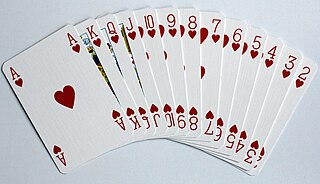
Frog, sometimes called solo sixty, is a trick-taking, card game for 3 players that is or was popular in southern USA and Mexico. It is a member of the German Tarok group of games that originate from an attempt to play the tarot card game of Grosstarock with non-tarot cards.

Grasobern, Grasoberl, Grasoberln, Graseberla, Grünobern, Lauboberl or Laubobern is a card game that was once commonly played in Old Bavaria, especially in the old counties of Bad Aibling and Rosenheim, and is still popular in eastern Bavaria, especially in Upper Palatinate. The game has relatively simple rules and thus a rather relaxing and leisurely character without the mental demands of Schafkopf or psychological stress of Watten, two other traditional Bavarian card games. The name is taken from the game's penalty card, the Ober of Leaves. The suit of Leaves is known in German variously as Laub, Gras ("grass") or Grün ("green").
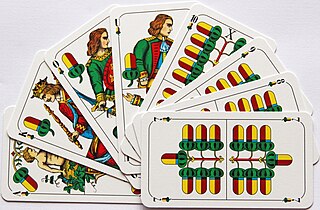
Wallachen is an Old Bavarian card game, which used to be very popular in eastern Bavaria. Although, by 2012, it had become a rarer sight at pub tables, there have been more recent moves to revive it. Wallachen is a relatively simple three-hander that is easy to learn. As a result, like Grasobern, it has a relatively relaxed character without the mental demands of Schafkopf or the psychological stress of Watten. It is a member of the Préférence family of card games.
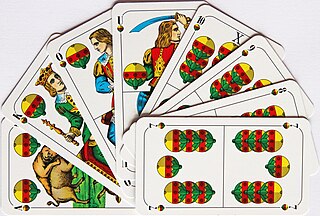
Bolachen is a traditional card game for 3 players that is played in parts of southern Upper Bavaria, especially in the Rupertiwinkel area of the Berchtesgaden Land, where there is a cultural influence from Salzburg, and the state of Salzburg itself. It is a Bavarian variant of the more complex, old Austrian game of Préférence. Like its Bavarian cousin, Wallachen, Bolachen is threatened by extinction.

Blattla is a Bavarian card game for four players, who usually form two teams of two for each deal. It is a simplified version of Schafkopf and Bierkopf and is thus a point-trick game. Unlike those two games, in Blattla the Obers and Unters are not permanent trumps. In order to learn the rules of Schafkopf, it can be an advantage to first become familiar with Blattla. The game is traditionally played with Bavarian pattern cards.

Officers' Schafkopf is a German point-trick card game for two players which is based on the rules of Schafkopf. The game is a good way to learn the trumps and suits for normal Schafkopf and to understand what cards one is allowed to play. It is similar in concept to Officers' Skat.

Taroc l'Hombre or Tarok-l'Hombre is an extinct card game of the European Tarot card game family for three players that was played with a full pack of 78 tarot cards, known as tarocs or taroks. It emerged in Italy around 1770 as Tarocc 'Ombre but later spread to Austria and Germany. It was a crucial development, with the important idea of bidding imported from l'Hombre, hence the name.
Herzblatt or Herzblättchen is a German card game of the ace–ten family for two to five players. It bears a certain resemblance to the extinct 19th-century game of Piquesept, however without the special rules associated with the trump Seven.

German Tarok, sometimes known as Sansprendre or simply Tarok, is an historical ace–ten card game for three players that emerged in the 18th century and is the progenitor of a family of games still played today in Europe and North America. It became very popular in Bavaria and Swabia during the 19th century before being largely superseded by Schafkopf, but has survived in the local forms of Bavarian Tarock and Tapp. During the mid-19th century, it became the most popular card game among Munich's middle classes and was also played in the late 19th and early 20th centuries by notable Bavarian author Ludwig Thoma, frequently appearing in his novels and journal articles. It was superseded after the First World War by other forms such as Bavarian Tarock.

















